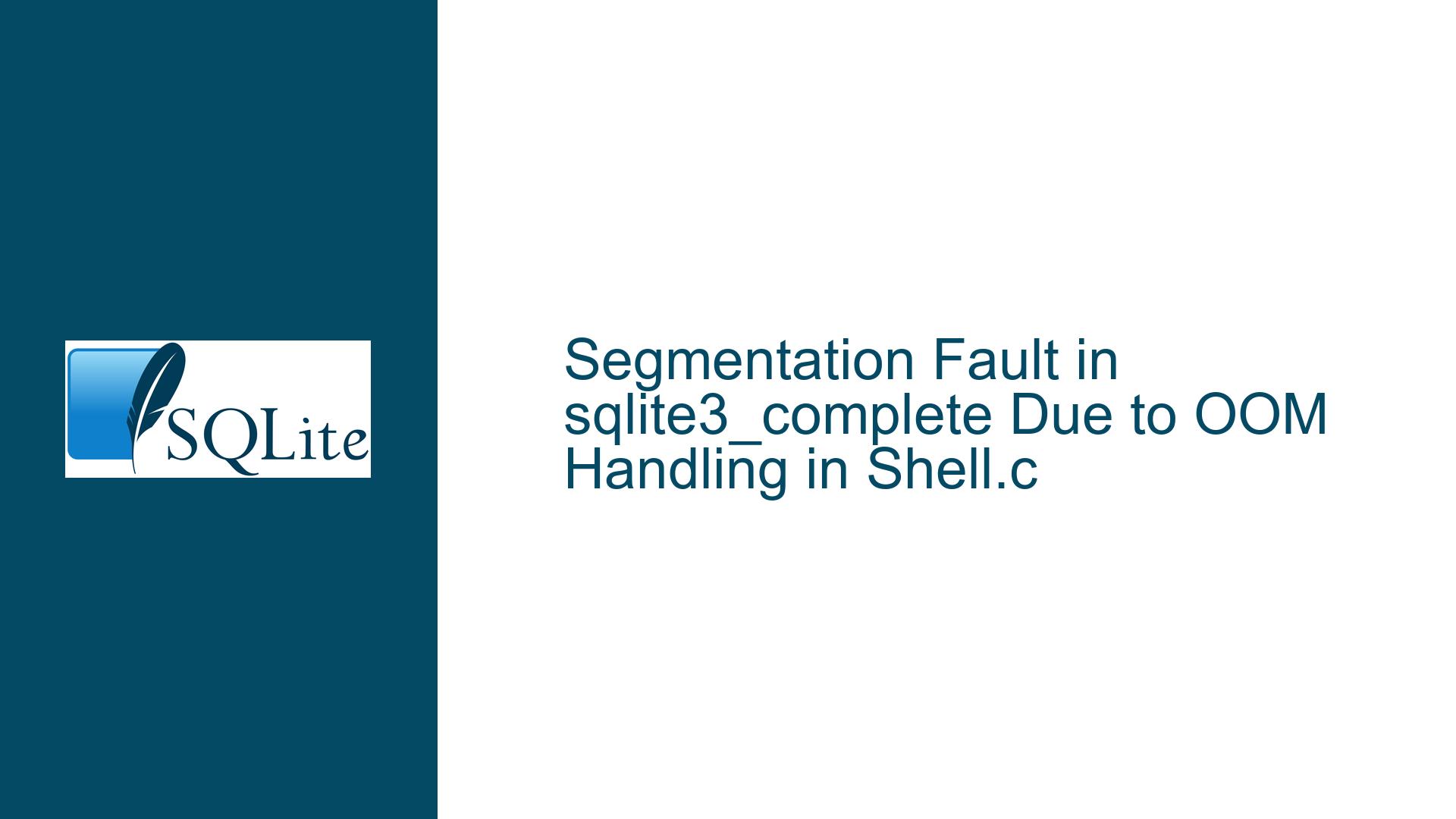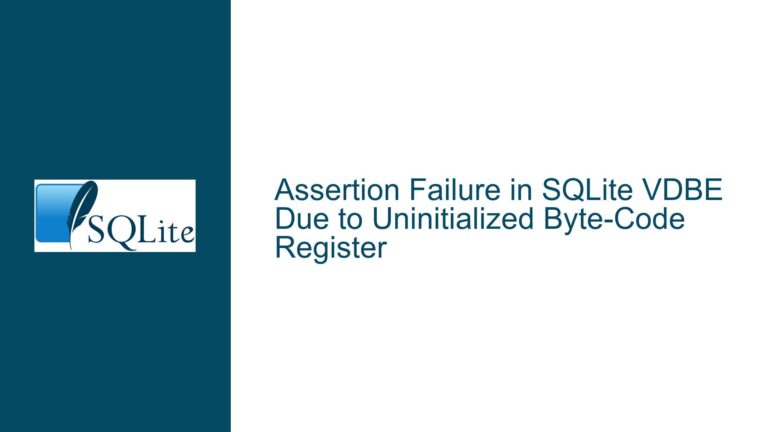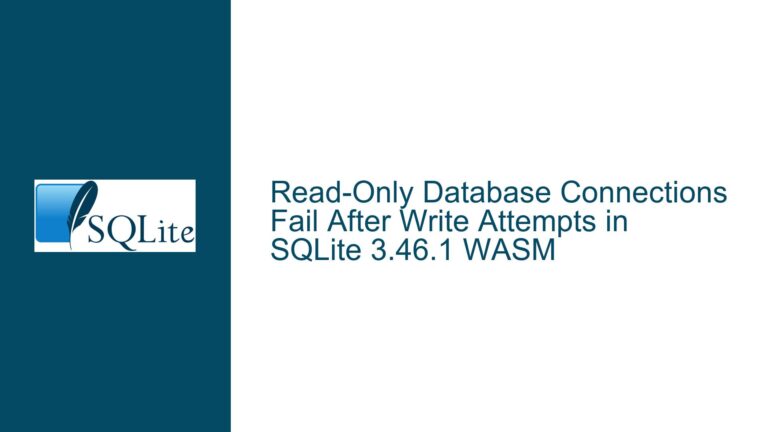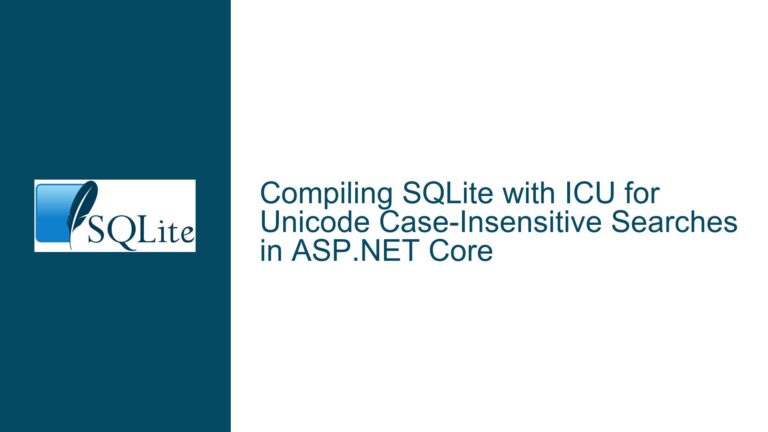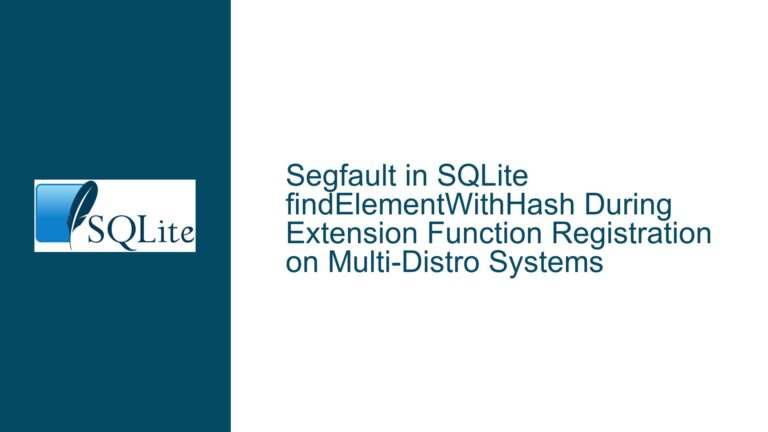Segmentation Fault in sqlite3_complete Due to OOM Handling in Shell.c
Issue Overview: Segmentation Fault in sqlite3_complete Function
The core issue revolves around a segmentation fault occurring in the sqlite3_complete function within the SQLite shell utility (shell.c). This fault is triggered when the function is passed a NULL pointer, which results from an out-of-memory (OOM) condition during the execution of sqlite3_mprintf. The sqlite3_mprintf function is used to dynamically allocate and format a string, but when memory allocation fails, it returns NULL. This NULL value is then passed directly to sqlite3_complete, leading to a segmentation fault.
The issue is particularly insidious because it is not consistently reproducible. Factors such as specific patches, instrumentation (e.g., ASAN), and even the use of hard_heap_limit can influence whether the crash occurs. This inconsistency makes the bug challenging to diagnose and fix. The problem is localized to the SQLite shell utility and does not affect the core functionality of SQLite itself. However, it highlights a critical flaw in the error-handling logic within the shell utility, specifically in how OOM conditions are managed.
The backtrace from the debugger (gdb) clearly shows the fault originating in sqlite3_complete when it attempts to process a NULL pointer. The fault propagates through several layers of the shell utility, including printSchemaLine, dump_callback, and run_schema_dump_query, before ultimately causing the program to crash. The issue is exacerbated by the fact that the shell utility does not consistently check for OOM conditions after calling sqlite3_mprintf, leading to undefined behavior when memory allocation fails.
Possible Causes: OOM Handling and NULL Pointer Dereferencing
The root cause of the segmentation fault lies in the improper handling of OOM conditions within the SQLite shell utility. Specifically, the function sqlite3_mprintf is used to allocate memory for a formatted string, but the return value is not checked for NULL before being passed to sqlite3_complete. When sqlite3_mprintf fails due to insufficient memory, it returns NULL, which is then dereferenced by sqlite3_complete, causing the segmentation fault.
The issue is further complicated by the fact that the shell utility includes a function called shell_check_oom, which is designed to handle OOM conditions. However, this function is not consistently used after calls to sqlite3_mprintf. In the specific code segment where the fault occurs, sqlite3_mprintf is called to create a new string, but the result is not checked for NULL before being passed to sqlite3_complete. This oversight in error handling is the direct cause of the segmentation fault.
Another contributing factor is the use of fuzzing to discover this bug. Fuzzing, particularly greybox fuzzing, involves generating random inputs to test the robustness of a program. In this case, the fuzzer generated a proof-of-concept (PoC) input that triggered the OOM condition, leading to the segmentation fault. The fuzzer’s ability to manipulate memory allocation limits (e.g., using hard_heap_limit) played a key role in exposing this issue. This highlights the importance of thorough error handling, especially in scenarios where memory allocation can fail.
The issue is also influenced by external factors such as the specific version of SQLite being used, the presence of certain patches, and the use of instrumentation tools like ASAN. These factors can affect the reproducibility of the bug, making it difficult to diagnose and fix. For example, some patches may inadvertently change the behavior of memory allocation, while instrumentation tools may alter the program’s execution in ways that prevent the bug from manifesting.
Troubleshooting Steps, Solutions & Fixes: Addressing OOM Handling in Shell.c
To resolve the segmentation fault in sqlite3_complete, the following steps should be taken:
Implement Consistent OOM Checks: The primary fix involves ensuring that all calls to
sqlite3_mprintfare followed by a check forNULL. This can be done by using the existingshell_check_oomfunction, which is designed to handle OOM conditions. In the specific code segment where the fault occurs, the return value ofsqlite3_mprintfshould be checked before being passed tosqlite3_complete. For example:char *zNew = sqlite3_mprintf("%s%s;", zOrig, azTerm[i]); shell_check_oom(zNew); // Check for OOM condition if (sqlite3_complete(zNew)) { size_t n = strlen(zNew); zNew[n-1] = 0; zToFree = zNew; z = zNew; break; } sqlite3_free(zNew);This ensures that
sqlite3_completeis never called with aNULLpointer, preventing the segmentation fault.Enhance Fuzzing for OOM Conditions: Given that the bug was discovered through fuzzing, it is important to enhance the fuzzing process to specifically target OOM conditions. This can be done by integrating a custom memory allocator that simulates OOM conditions at random intervals. By doing so, the fuzzer can more effectively uncover issues related to memory allocation failures. This approach aligns with the suggestion made in the discussion to use a replacement allocator to test OOM handling.
Review and Test Patches: Since the reproducibility of the bug is affected by specific patches, it is crucial to review and test any patches that may impact memory allocation or error handling. This includes patches that modify the behavior of
sqlite3_mprintforsqlite3_complete, as well as patches that introduce new features or optimizations. Testing should be conducted under various conditions, including low-memory scenarios, to ensure that the patches do not introduce or exacerbate OOM-related issues.Instrumentation and Debugging: The use of instrumentation tools like ASAN can help identify memory-related issues, including OOM conditions. However, as noted in the discussion, these tools can also affect the reproducibility of the bug. Therefore, it is important to use a combination of instrumentation and manual debugging to thoroughly test the fixes. This includes running the shell utility with and without instrumentation to ensure that the bug is consistently resolved.
Documentation and Best Practices: To prevent similar issues in the future, it is important to document best practices for handling OOM conditions in the SQLite shell utility. This includes guidelines for checking the return values of memory allocation functions, using
shell_check_oomconsistently, and testing under low-memory conditions. By establishing clear guidelines, developers can avoid common pitfalls and ensure robust error handling.Community Feedback and Testing: Finally, it is important to engage the SQLite community in testing the fixes and providing feedback. This can be done by sharing the fixes on the SQLite forum or mailing list and encouraging users to test the changes under various conditions. Community feedback can help identify any remaining issues and ensure that the fixes are effective across different environments and use cases.
By following these steps, the segmentation fault in sqlite3_complete can be effectively resolved, improving the robustness and reliability of the SQLite shell utility. The fixes not only address the immediate issue but also enhance the overall error-handling capabilities of the utility, making it more resilient to OOM conditions and other memory-related issues.
